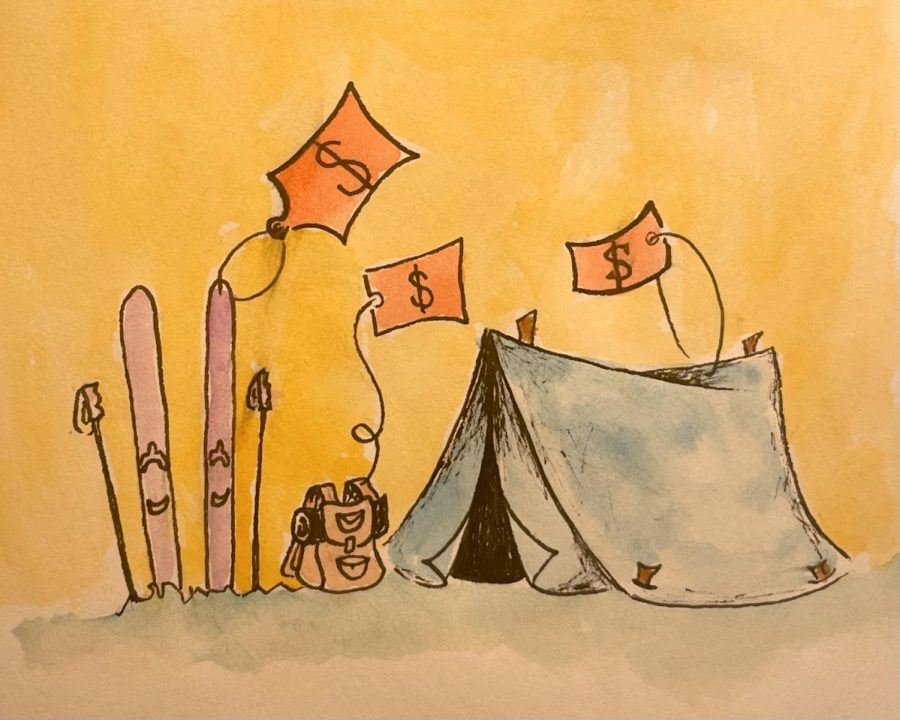Must be this rich to ride: The monetization of the outdoors
November 14, 2022
Peace and solitude are why so many people go into the wilderness, but these days, you’ll often find rich people looking to show off their new skis and Black Diamond jackets.
Outdoor activities have been colonized by the rich and privileged. They’ve become a fashion show for gear and many have lost sight of truly enjoying the sport and the outdoors.
People who are moving to Burlington often have prior experience with outdoor activities. The University of Vermont has the biggest college ski and snowboard club in the country, according to the UVM Ski & Snowboard Club website.
Skiing and snowboarding attracts plenty of avid winter adrenaline junkies from all across the U.S. and are a great way to make friends and ward off seasonal depression.
However, for those who didn’t grow up shredding down mountains on Burton snowboards, hitting the slopes can seem daunting. Not just in a physical way, but in a monetary way as well.
Ski pass prices can be hundreds of dollars for even smaller mountains like Bolton Valley and Smugglers’ Notch, with well-known multi-resort passes, like the Ikon Pass, costing buyers nearly a grand. Base pricing for the Ikon Pass is $919 with the all-included pass costing $1,229, according to the Ikon Pass website.
Though the Ikon Pass is $679 for college students, the discounted price is still not reasonable for the average college kid.
For someone who is trying to pay for rent, textbooks and food, buying a ski pass on top of all that is enough to break the bank, especially with rent prices skyrocketing all around the city.
On top of that, gear prices will take a chunk out of the savings account as well. I paid nearly $500 for used skis, a jacket, boots and poles. This is the lowest price I could find for ski gear in the area and I’m not even fully equipped yet.
For those who never learned to ski or don’t have the gear, winter is going to be either extremely isolating or unrealistically pricey.
Skiing isn’t the only expensive outdoor activity. Even National Parks have entrance fees of $15 per person, according to the National Parks Service Website. These fees add up on top of the cost of different hiking shoes and other expensive gear that most people recommend for hikes and park visits.
Over time, the price of this gear adds up, further widening the gap between people who have the money to experience all the outdoors has to offer and those who don’t.
High costs impact historically oppressed communities as well. Due to years of racial discrimination, including job and housing discrimination, people of color tend to have lower income rates, according to a Dec. 14, 2020 article by the North Carolina State College of Natural Resources.
This leads those groups to have less disposable income for trips to National Parks and ski resorts. The high pricing makes closing the racial gap even harder.
Recently, several groups have popped up aiming to end racial disparity outdoors. Groups such as Outdoor Afro, Indigenous Women Hike and People of Color Outdoors—the latter being a UVM-based club—all focus on making wilderness enjoyment more accessible for historically oppressed communities.
While these helpful advocacy and affinity groups are out there, they can still be difficult to access. They certainly provide a pathway outdoors, but the vast majority of adventurers are outdoorsmen or people of wealthy backgrounds.
Burlington has long been known for its outdoor community, but for someone who isn’t using their parents’ credit card, breaking into the community isn’t easy.
The rise in lift and day pass prices aren’t in tune with the inflation rate, according to a Jan. 31 report from The Rake Vermont.
Day pass prices exceed $100 now for many popular mountains. For many ski resorts, this has been a 218% price increase since the 1980s.
Even with inflation, these prices are higher.
This drastic price increase scares off newcomers to the sport who can’t justify the hefty price tag.
We need to make the outdoors accessible for everyone and not judge people who can’t afford high-end equipment or are just entering the sport. We cannot let the wilderness become another exclusive club for the privileged.
